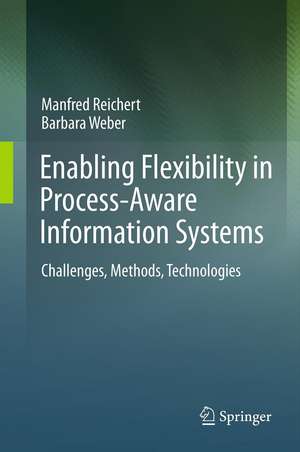Enabling Flexibility in Process-Aware Information Systems: Challenges, Methods, Technologies
Autor Manfred Reichert, Barbara Weberen Limba Engleză Paperback – 20 sep 2014
With this book, Reichert and Weber address these flexibility needs and provide an overview of PAIS with a strong focus on methods and technologies fostering flexibility for all phases of the process lifecycle (i.e., modeling, configuration, execution and evolution). Their presentation is divided into six parts. Part I starts with an introduction of fundamental PAIS concepts and establishes the context of process flexibility in the light of practical scenarios. Part II focuses on flexibility support for pre-specified processes, the currently predominant paradigm in the field of business process management (BPM). Part III details flexibility support for loosely specified processes, which only partially specify the process model at build-time, while decisions regarding the exact specification of certain model parts are deferred to the run-time. Part IV deals with user- and data-driven processes, which aim at a tight integration of processes and data, and hence enable an increased flexibility compared to traditional PAIS. Part V introduces existing technologies and systems for the realization of a flexible PAIS. Finally, Part VI summarizes the main ideas of this book and gives an outlook on advanced flexibility issues.
The book’s target groups include researchers, PhD students and Master students in the field of information systems. After readingthe book, they will better understand PAIS flexibility aspects. To support the easy use as a textbook, a series of exercises is provided at the end of each chapter and slides and further teaching material are available on the book’s web site www.flexible-processes.com. Professionals specializing in business process management (BPM) who want to obtain a good understanding of flexibility challenges in BPM and state-of-the-art solutions will also benefit from the presentations of open source as well as commercial process management systems and related practical scenarios.
| Toate formatele și edițiile | Preț | Express |
|---|---|---|
| Paperback (1) | 344.27 lei 6-8 săpt. | |
| Springer Berlin, Heidelberg – 20 sep 2014 | 344.27 lei 6-8 săpt. | |
| Hardback (1) | 349.40 lei 6-8 săpt. | |
| Springer Berlin, Heidelberg – 28 aug 2012 | 349.40 lei 6-8 săpt. |
Preț: 344.27 lei
Preț vechi: 430.34 lei
-20% Nou
Puncte Express: 516
Preț estimativ în valută:
65.88€ • 69.27$ • 54.43£
65.88€ • 69.27$ • 54.43£
Carte tipărită la comandă
Livrare economică 16-30 aprilie
Preluare comenzi: 021 569.72.76
Specificații
ISBN-13: 9783642430268
ISBN-10: 3642430260
Pagini: 536
Ilustrații: XVIII, 518 p.
Dimensiuni: 155 x 235 x 28 mm
Greutate: 0.74 kg
Ediția:2012
Editura: Springer Berlin, Heidelberg
Colecția Springer
Locul publicării:Berlin, Heidelberg, Germany
ISBN-10: 3642430260
Pagini: 536
Ilustrații: XVIII, 518 p.
Dimensiuni: 155 x 235 x 28 mm
Greutate: 0.74 kg
Ediția:2012
Editura: Springer Berlin, Heidelberg
Colecția Springer
Locul publicării:Berlin, Heidelberg, Germany
Public țintă
GraduateCuprins
Part I Basic Concepts and Flexibility Issues.- Introduction.- Process-Aware Information Systems.- Flexibility Issues in Process-Aware Information Systems.- Part II Flexibility Support for Pre-Specified Processes.- Process Modeling & Flexibility-by-Design.- Process Configuration Support.- Exception Handling.- Ad-hoc Changes of Process Instances.- Monitoring and Mining Flexible Processes.- Process Evolution and Instance Migration.- Business Process Compliance.- Part III Flexibility Support for Loosely-Specified Processes.- Concretizing Loosely-Specified Processes.- Constraint-based Process Models.- Part IV User- and Data-driven Processes.- User- and Data-driven Processes.- A Framework for Object-Aware Processes.- Part V Technologies Enabling Flexibility Support in Process-Aware Information Systems.- AristaFlow BPM Suite.- Alaska Simulator Toolset.- Existing Tool Support for Flexible Processes.- Part VI Summary, References, Appendices.- Epilogue.- Overview of BPMN Elements.
Recenzii
“The book is written by two renowned BPM experts and a must-read for anyone interested in flexible process support within information systems. It shows that BPM is not just about making diagrams. The real challenge is to realize information systems that support processes without jeopardizing flexibility. The authors present a wide range of powerful techniques to support this.” Wil van der Aalst, Eindhoven University of Technology, The Netherlands
“Comprehensive coverage of flexibility in PAIS, clear explanation of concepts and their practical applications, and easily understandable examples - this book is an excellent choice for students, computer scientists, and practitioners.” Stefanie Rinderle-Ma, University of Vienna, Austria
“If there would be any doubt left, this book annihilates the picture of workflow systems as being rigid, unyielding types of information systems. The authors draw from their deep knowledge of the field to explain the state-of-the-art with respect to flexibility mechanisms: A rich and highly readable treatise.” Hajo Reijers, Eindhoven University of Technology, The Netherlands
“The book provides an excellent description of recent advancements in the area of business process flexibility. It is well-organized, comprehensive, and comprehensible. A highly recommended text book, both for BPM researchers and advanced courses.” Pnina Soffer, University of Haifa, Israel
“Comprehensive coverage of flexibility in PAIS, clear explanation of concepts and their practical applications, and easily understandable examples - this book is an excellent choice for students, computer scientists, and practitioners.” Stefanie Rinderle-Ma, University of Vienna, Austria
“If there would be any doubt left, this book annihilates the picture of workflow systems as being rigid, unyielding types of information systems. The authors draw from their deep knowledge of the field to explain the state-of-the-art with respect to flexibility mechanisms: A rich and highly readable treatise.” Hajo Reijers, Eindhoven University of Technology, The Netherlands
“The book provides an excellent description of recent advancements in the area of business process flexibility. It is well-organized, comprehensive, and comprehensible. A highly recommended text book, both for BPM researchers and advanced courses.” Pnina Soffer, University of Haifa, Israel
Notă biografică
Manfred Reichert is a professor at the University of Ulm (Germany). Prior to this, he was working as associate professor at the University of Twente (UT). At UT he was also leader of strategic research orientations on e‐health and on service‐oriented architectures, and member of the Management Board of the Centre for Telematics and Information Technology (CTIT), which is the largest ICT research institute in the Netherlands (with more than 400 researchers). His major research interests are next generation process management technology, service‐oriented architectures, and advanced applications for flexible process-aware information systems. Manfred is co‐founder of the industrial spin-off AristaFlow GmbH, and he has been participating in numerous research projects in the BPM area and contributed more than 200 scientific papers on related topics.
Barbara Weber is an associate professor at the Department of Computer Science at the University of Innsbruck, Austria, where she is a member of the Quality Engineering (QE) research group and head of the research cluster on business processes and workflows at QE. She has published more than 80 research papers at international conferences and articles in prestigious journals. Her research interests include integrated process life cycle support, change patterns, process flexibility, process modeling, user support in flexible, process-aware information systems, recommendations to optimize process execution, and empirical research in BPM..
Barbara Weber is an associate professor at the Department of Computer Science at the University of Innsbruck, Austria, where she is a member of the Quality Engineering (QE) research group and head of the research cluster on business processes and workflows at QE. She has published more than 80 research papers at international conferences and articles in prestigious journals. Her research interests include integrated process life cycle support, change patterns, process flexibility, process modeling, user support in flexible, process-aware information systems, recommendations to optimize process execution, and empirical research in BPM..
Textul de pe ultima copertă
In today’s dynamic business world, the success of a company increasingly depends on its ability to react to changes in its environment in a quick and flexible way. Companies have therefore identified process agility as a competitive advantage to address business trends like increasing product and service variability or faster time to market, and to ensure business IT alignment. Along this trend, a new generation of information systems has emerged—so-called process-aware information systems (PAIS), like workflow management systems, case handling tools, and service orchestration engines.
With this book, Reichert and Weber address these flexibility needs and provide an overview of PAIS with a strong focus on methods and technologies fostering flexibility for all phases of the process lifecycle (i.e., modeling, configuration, execution and evolution). Their presentation is divided into six parts. Part I starts with an introduction of fundamental PAIS concepts and establishes the context of process flexibility in the light of practical scenarios. Part II focuses on flexibility support for pre-specified processes, the currently predominant paradigm in the field of business process management (BPM). Part III details flexibility support for loosely specified processes, which only partially specify the process model at build-time, while decisions regarding the exact specification of certain model parts are deferred to the run-time. Part IV deals with user- and data-driven processes, which aim at a tight integration of processes and data, and hence enable an increased flexibility compared to traditional PAIS. Part V introduces existing technologies and systems for the realization of a flexible PAIS. Finally, Part VI summarizes the main ideas of this book and gives an outlook on advanced flexibility issues.
The book’s target groups include researchers, PhD students and Master students in the field of information systems. After readingthe book, they will better understand PAIS flexibility aspects. To support the easy use as a textbook, a series of exercises is provided at the end of each chapter and slides and further teaching material are available on the book’s web site www.flexible-processes.com. Professionals specializing in business process management (BPM) who want to obtain a good understanding of flexibility challenges in BPM and state-of-the-art solutions will also benefit from the presentations of open source as well as commercial process management systems and related practical scenarios.
With this book, Reichert and Weber address these flexibility needs and provide an overview of PAIS with a strong focus on methods and technologies fostering flexibility for all phases of the process lifecycle (i.e., modeling, configuration, execution and evolution). Their presentation is divided into six parts. Part I starts with an introduction of fundamental PAIS concepts and establishes the context of process flexibility in the light of practical scenarios. Part II focuses on flexibility support for pre-specified processes, the currently predominant paradigm in the field of business process management (BPM). Part III details flexibility support for loosely specified processes, which only partially specify the process model at build-time, while decisions regarding the exact specification of certain model parts are deferred to the run-time. Part IV deals with user- and data-driven processes, which aim at a tight integration of processes and data, and hence enable an increased flexibility compared to traditional PAIS. Part V introduces existing technologies and systems for the realization of a flexible PAIS. Finally, Part VI summarizes the main ideas of this book and gives an outlook on advanced flexibility issues.
The book’s target groups include researchers, PhD students and Master students in the field of information systems. After readingthe book, they will better understand PAIS flexibility aspects. To support the easy use as a textbook, a series of exercises is provided at the end of each chapter and slides and further teaching material are available on the book’s web site www.flexible-processes.com. Professionals specializing in business process management (BPM) who want to obtain a good understanding of flexibility challenges in BPM and state-of-the-art solutions will also benefit from the presentations of open source as well as commercial process management systems and related practical scenarios.
Caracteristici
Comprehensively describes all relevant state-of-the-art concepts, methods and technologies enabling process flexibility, e.g., process configuration, exception handling, ad-hoc process changes, process schema evolution, and many more Includes presentations of both open source and commercial process management systems Enhanced by a website with ready-to-use slides, exercises and solutions, and further teaching material Written by two of the most prominent researchers in the BPM area Includes supplementary material: sn.pub/extras Includes supplementary material: sn.pub/extras












